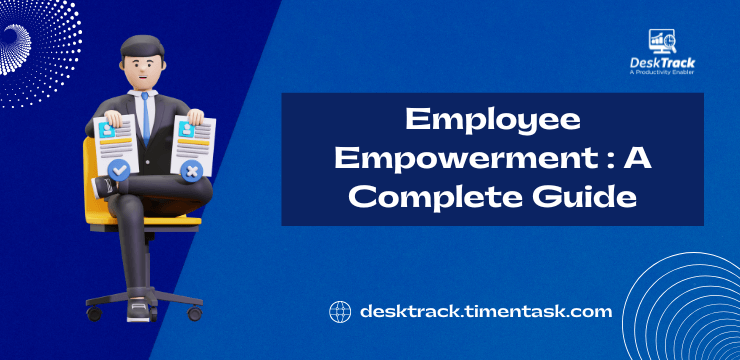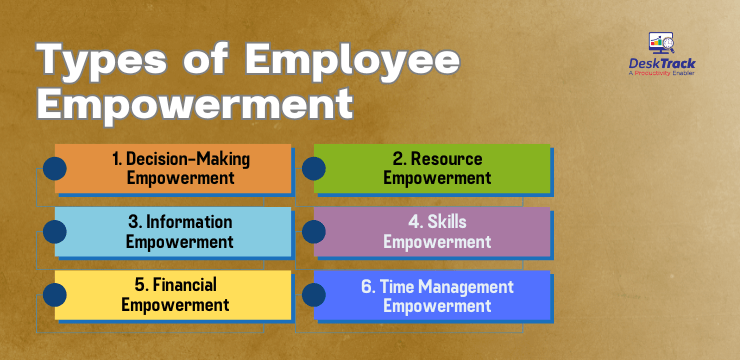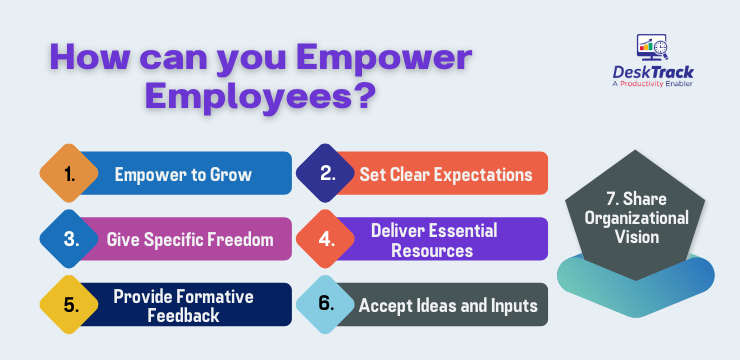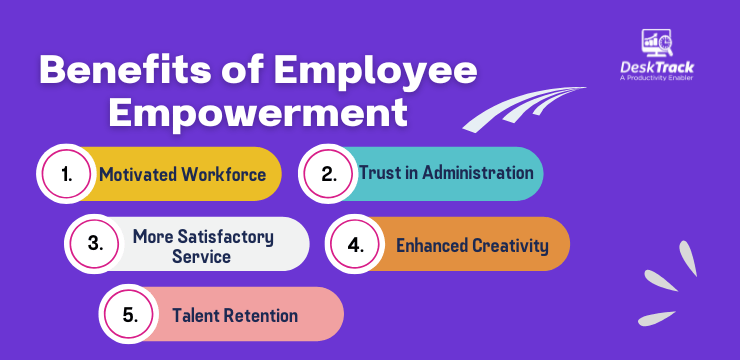
Employee empowerment leads to a stronger foundation for future growth and success for your organization. As we all know, the stronger the foundation, the more robust the building. Gone are the days of micromanagement and misusing authority over employees. The work world and atmosphere are now employee-centric. So, we need leaders and not managers who are bossing around.
These days, for maximum output, efficiency, work performance, and productivity, empowerment of employees is essential. Plus, you also need to give them more freedom over how they work. However, it’s also essential for you to guide them whenever needed. That is, this aspect of the organizational success of your business is not as simple as it sounds.
So, in today’s post, we will take you through the A to Z of employee empowerment and how it can benefit your organization. By the end of today’s blog, you will have all the useful insights you need to keep your teams empowered and give their best work performance for continual growth and success.
What is Employee Empowerment?
Empowerment to employees means providing power and independence to make decisions without micromanaging, identifying their capacities and abilities, and marking consequences within their operations. It helps employees to get more focused and devoted to fulfilling their goals.
Employee empowerment in HRM can help them even more as they can start their work or tasks without any supervision or manager guidance. It permits employees to assign tasks and responsibilities with help and authorization to achieve a more satisfactory organizational outcome.
Companies exercising empowering employees should keep their work environment mainly about learning, managing, and empowering rather than a bossy or hierarchical administration. By implementing this function, employees will perform best for their operation excellence.
Read Also: Top 15 Employee Scheduling Software for Businesses in 2024
Why is Employee Empowerment Important?
The importance of employee empowerment in the workplace leads to proper management, high-morale operations, engagement, and a speedy and flexible environment. It can help them with self-direction and maintenance in their work performance. Also, make them more dedicated and focused to achieve their business targets.
Some studies have shown that companies that have implemented empowerment for employees
at work leads to more productivity, and employees perform with more enthusiasm and loyalty by providing highly innovative work with multiple job satisfaction.
The importance of employee empowerment meaning in organizations among employees and employers builds trust and transparency and enhances morale and strength. Which helps them earn more profit for their business.
Types of Employee Empowerment

Empowering your employees refers to giving employees the authority, resources, and support they need to make decisions and take actions that contribute to the success of your business. With that being said, let’s look into it’s categorization.
1. Decision-Making Empowerment
This type of employee empowerment gives your human resources the authority to make decisions on their own, without having to seek approval from higher-ups. It involves trusting employees to make the right decisions based on their experience, knowledge, and judgment.
2. Resource Empowerment
This type of empowerment involves giving employees the resources they need to succeed, such as tools like employee time tracking software, training, and technology. It allows employees to be more efficient and effective in their work and contributes to their overall sense of autonomy and control.
3. Information Empowerment
Empowering your employees with data and information involves providing them with the information they need to do their jobs effectively, such as market trends, customer feedback, and industry news. It enables employees to be more strategic and proactive in their decision-making.
4. Skills Empowerment
This type of employee empowerment involves developing employees’ skills and capabilities through training, coaching, and mentoring. It allows employees to take on new challenges and responsibilities and to feel more confident in their ability to contribute to the organization’s success.
5. Financial Empowerment
empowering employees with finances involves giving them a charge over the budget. In simple terms, it’s budgetary freedom. Overall, what it does is give employees freedom over how much expenses they want to spend on certain decisions.
6. Time Management Empowerment
Time management employee empowerment in short means, giving work to your employees and letting them handle it. When employees have more control over their time, they become more efficient at managing their tasks.
How can you Empower Employees?

Empowering your employees at the workplace refers to the practice of growth in trust, communication, work performance management, and delegation to authorize employees. However, is this even possible? Yes, it is. Below, we will show you how.
1. Empower to Grow
Pushing your employees only into work 24/7 without knowing their concerns and opinions can make them feel less motivated, distracted, and bored. Rather than this, you can motivate your employees through employee empowerment to grow and develop their abilities and duties on each level.
2. Set Clear Expectations
Empowering your employees also involves setting clear expectations, you can help your employees make and take better decisions without micromanaging them all the time for every small task. Specify the perimeters by which your employees can feel free to keep their opinions in front of their managers or leaders while assuring the decisions are in the favor of the company.
3. Give Specific Freedom
A big part of employee empowerment is freedom. When it comes to completing a task and achieving precise outcomes every manager or team leader needs the best from their employees. However, following the same methods and techniques for fulfilling the goals may not be possible for all team members. So, providing specific freedom to your employees in completing the allotted tasks can make them feel privileged, and this will motivate them to achieve the target speedily in their comfort and approach.
4. Deliver Essential Resources
Implementing empowerment to employees in your organization can resolve multiple issues faced by your employees but we cannot say it can resolve everything as your employees need many more things to achieve their goals on time. Delivering essential resources and tools can make employee work more easygoing and speedy without expecting any help or supervision from their managers.
5. Provide Formative Feedback
As we mentioned before, employee empowerment is not as simple as it sounds. Whether you are a leader, manager, or supervisor, every action, reaction, or feedback makes a significant impact on every employee working in your organization. Therefore, providing formative feedback to your employees on their accomplishments can create interest to achieve another goal with the same enthusiasm. Whereas it can create self-doubt and disappointment, among others. So, be clear and thoughtful about the feedback you deliver.
6. Accept Ideas and Inputs
Decision-making and goal-setting are the two most important aspects for an organization to achieve its desirable objectives. Having multiple ideas and inputs can help your business perform better in the market and as per the needs and requirements of your clients. However, this can also help in empowering your employees and open up your workforce to new visions and concepts for future goals.
7. Share Organizational Vision
It is an essential part of employee empowerment to make your employees feel they are benefiting their organization in its growth and development. Sharing the clear vision of your organization can make your employees feel empowered with the understanding of their contribution.
Benefits of Employee Empowerment

Keeping your employees empowered is the key to employee satisfaction, engagement, and success. Here are some of the benefits that will help you understand empowerment to employees satisfactorily:
1. Motivated Workforce
Employee empowerment leads to self-disciplined and managed employees who know their duties better and do not need any particular leadership from their managers to achieve their targets. They know their responsibilities and what can be desired from them to bring the great vision of their organization to the market for more profit and better outcomes.
2. Trust in Administration
When employees are empowered, they know their worth and value in your company and are more likely to perform nicely and inclined to do more and speedily. It can benefit both the company and the employees. Thus, they will take benchmark changes and innovations to bring their company to its best. Trust or transparency in administration can improve employee engagement, connections, communication gaps, progress, performance, and results.
3. More Satisfactory Service
Employee empowerment leads to better performance in every field, whether sales or marketing, collaboration, customer services, or assistance. The employees work with complete enthusiasm and dedication and provide more satisfactory services to the clients when they feel empowered.
4. Enhanced Creativity
Empowering your employees will also lead to a creative and loyal workforce. Empowerment among employees plays the role of connecting people, sharing knowledge, and inspiring people to communicate, take a stand for others, and attempt new techniques to solve issues and deliver outcomes.
5. Talent Retention
Employee empowerment plays an essential role in recruiting top talents for any company. It empowers them to show their abilities and capacities. So, if you hire successful talents for your organization, they are better set to draw and maintain talented people than those who do not. Individuals are always in search of a company where they can learn, determine challenges, and succeed in their professions.
Employee Empowerment and Its Role in Team Building

The role of empowerment of employees is a lot bigger than it looks on the surface. Empowering your teams significantly builds up more teamwork, growth, and success. With that out of our way, here’s how it works.
1. Set it Up
Employee empowerment and team building go hand in hand. Thus both involve providing your employees with transparent instructions. Overall, both relate to every individual’s part within your business environment. An expert team here is to create a mission statement for your business, which can help both you and your employees.
2. Set Objectives
Now that you have begun building your teams, it’s time for some more team empowerment. The idea behind setting individual objectives is to ensure that individuals take responsibility for their work. Here, we would recommend your goals align with the teams and your business as a whole for the best results.
3. Inspire Teamwork
You can’t build teams with employee empowerment without encouraging teamwork. However, it’s not simple, some employees don’t see eye to eye on the same team. It means that you need to be skilled enough to make them work together by putting their sentiments aside.
4. Evaluate
The next step is to see the results of how you built teams through workforce empowerment. Now it’s time for how is it going vs how it should have gone analysis. The reason you are building teams is because you want results. Thus it’s essential to continuously evaluate and improve outputs.
5 Get Feedback
The next step is to get employee feedback. You need to know that is this even helping them in any way. How much the teams are engaged through employee empowerment. If the results are not fruitful, you may need to reconsider the above factors.
Read Also: Understanding Effective Employee Management System
How is Employee Empowerment Different From Employee Autonomy?
There is no big difference between employee autonomy and empowerment to employees, as they are linked with each other. Autonomy is something that helps you to work freely and achieve your objectives without any micromanaging as per your comfort. Employees need to perform their tasks with complete power and liberty by utilizing their skills and capabilities to the best.
Regardless, autonomy may look baseless and undeveloped without employee empowerment. Like, if an employee has taken the responsibility to accomplish the allocated work on his own. Whereas, being in doubt about their capabilities or not sure about achieving the goal is considered a negative situation. With the help of associates and supervisors who consider decision-making, transparency, appreciation, and an encouraging environment in their complete workforce, employees can utilize their autonomy with trust and enthusiasm.
How are Employee Engagement and Empowerment Related?
Did you know that empowered employees feel 79% more engaged at work? Although both empowering teams and employee engagement are different, they are pretty much related to each other.
Empowerment at work means the freedom and authority employees have to make decisions. On the other hand, employee engagement means how dedicated and comitted an employee is to their organization. Moreover, in short, empowerment leads to more engagement because employees feel more capable and trusted.
Read Also: Top 10 Remote Employee Monitoring Software: A Complete Guide
Employee Empowerment Examples
So far, we just looked at empowerment to employees. However, it may seem impractical and impossible to implement. Well, you never know. Some of the leading industry giants are practically doing it and are gaining a competitive edge.
1. Netflix
As we all know, Netflix is the most acceptable employee empowerment example. It allows high levels of independence and liberty with a high standard for excellence and accountability for every worker, despite status or position. The company’s method of operating succeeds in employee confidence and motivation. Managers, Teams, and employees trust each other and the company to deliver all they require to flourish, providing them a feeling of undertaking privilege and the endeavor to see that projects are thriving.
2. Google
Google is a platform where innovation and creativity play a big role, and the company provides empowerment to employees that leads to new creations and development. Such employees are more likely to experiment with new things and present innovative ideas for better organizational results.
3. Adobe
Adobe has always been the company that provides complete freedom and autonomy to its employees. They think of permitting employees the freedom to work freely, ideate, manage, and bear duty for their job and influence within the association. Employees at Adobe work with complete responsibility and take chances to achieve new goals through employee empowerment.
4. Buffer
Buffer has integrated an environment with complete flexibility, transparency, better communication, and feedback to enhance company procedures, and employment engagements, and empower employees so that employees can perform better for adequate profit. Flexible management allows employees to decide where they want to work and can take time off when required, and it all leads to making the company successful and flourishing in all aspects.
5. Disney
Unless you have been living under a rock for your entire life, you must have heard the name of this famous animation studio. A classic example of employee empowerment is how they implement it at Walt Disney. Their success thrives on the fact that they always provide training to new employees. However, don’t get this one wrong. The focus is to not teach new skills but to have the employees embrace the company’s vision so that they can contribute more and in better ways to its objectives.
Objectives of Employee Empowerment
Only some organizations have the flexibility and transparency, and as a result, they face multiple challenges in maintaining new recruitments, employee work, upcoming operations, and many more. Thus, no one can work in an organization for the long term that does not provide empowerment to employees, freedom, and flexibility to work, allowing one to make self-decisions.
So, the main employee empowerment objective is to build trust and power among all the staff members and the administration in a manner that employees’ decisions should be considered in a way that makes them feel empowered and independent.
Employees open up in a culture that provides them complete freedom and sovereignty to work. Empowering Employees helps them give their best, acquire belief, decision-making, and confront the people they work with. It leads to employee satisfaction, work flexibility, improved morale, progress, and performance that can help companies boost productivity for long-term better results.
Along with these, employees need to operate on every level and participate in every type of assignment. Engagement leads to better alliance and communication among staff members that come up with team-building programs. As a result, employee empowerment helps employees to be self-directed, and these teams work independently to crack issues or complete tasks.
Organizations that need to empower employees should embrace the advanced involvement approaches where passion, acquaintance, communication, and rewards are conveyed to employees in the inferior levels of the administrative hierarchy. The job itself, management, staff members, and earnings are some of the critical aspects that impact the status of employees’ responsibility. Likewise, more promising employment opportunities and options for internship and instruction are found to be completely associated with responsibility. The administration should attempt to concentrate more on these characteristics to improve the dedication and duties of employees.
How to Enhance Employee Engagement
Below are some of the main points that will help you and your organization to enhance employee empowerment for better performance and results. It is what leads to more employee engagement Have a look and consider these points:
- Build a cheerful work culture
- Highlight teamwork
- Support open communication
- Utilize the proper technology
- Gather employee feedback
- Create transparency and trust
- Motivate your employees
- Give rewards and appreciation
Conclusion
We hope that now you have a clear understanding of employee empowerment and its benefits. It’s giving the freedom of work to employees with guidance, whenever needed, which is not micromanagement. By wrapping our heads around its practicality, one thing is clear, it leads to more employee engagement. Plus, you achieve a stronger employee infrastructure, which leads to more employee satisfaction, efficiency, productivity, and better work performance, employee monitoring software. However, at first glance, it’s not as simple as it sounds and impossible to implement. But the current work world and atmosphere are employee-centric. So, it’s essential to have your employees empowered for more growth and success. Plus, some of the industry giants have achieved a competitive edge and more success by giving freedom and liberty to their staff with guidance. Moreover, it’s important to also understand how you will provide your employees with this freedom and how much for the maximum benefits.
Frequently Asked Questions (FAQ)
Q. What is Empowering Employees?
Ans. Empowering Employees, in short, means giving them the freedom and power to make essential decisions. It never involves micromanagement. Thus, there is more employee engagement, satisfaction, and efficiency.
Q. How Can You Empower Your Employees?
Ans. You can empower your employees by implementing the following tips and strategies.
- Empower to Grow
- Set Clear Expectations
- Give Specific Freedom
- Deliver Essential Resources
- Provide Formative Feedback
- Accept Ideas and Inputs
- Share Organizational Vision
Q. What are the Categories of Empowerment for Employees?
Ans. You can empower your employees in different categories. The more the better.
- Decision-Making Empowerment
- Resource Empowerment
- Information Empowerment
- Skills Empowerment
- Financial Empowerment
- Time Management Empowerment
Q. What are the Benefits of Empowering Your Employees?
Ans. Here’s why you should keep your employees empowered.
- Motivated Workforce
- Trust in Administration
- More Satisfactory Service
- Enhanced Creativity
- Talent Retention
Q. What are Some Examples of Organizations That Empower their Employees?
Ans. Empowering employees at first glance may seem impractical. However, many organizations have achieved a competitive edge with it.
- Netflix
- Adobe
- Buffer
- Disney






